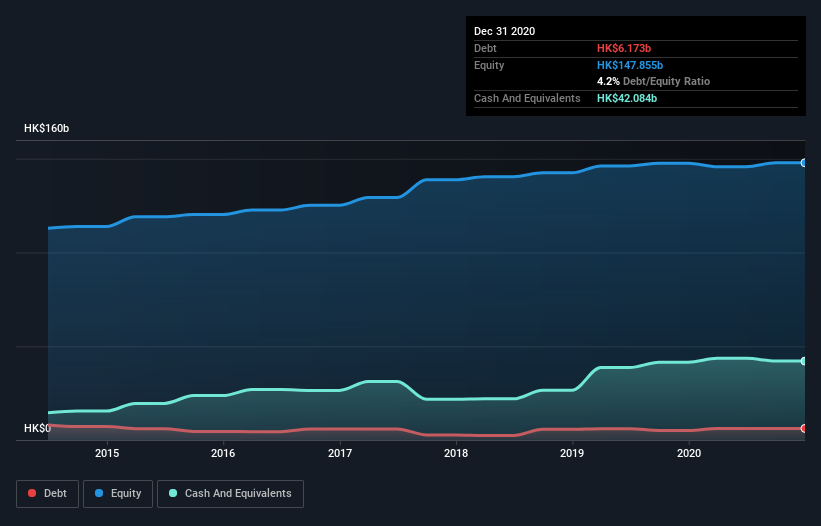- Hong Kong
- /
- Real Estate
- /
- SEHK:83
These 4 Measures Indicate That Sino Land (HKG:83) Is Using Debt Reasonably Well

Legendary fund manager Li Lu (who Charlie Munger backed) once said, 'The biggest investment risk is not the volatility of prices, but whether you will suffer a permanent loss of capital.' So it might be obvious that you need to consider debt, when you think about how risky any given stock is, because too much debt can sink a company. As with many other companies Sino Land Company Limited (HKG:83) makes use of debt. But is this debt a concern to shareholders?
When Is Debt A Problem?
Debt is a tool to help businesses grow, but if a business is incapable of paying off its lenders, then it exists at their mercy. Ultimately, if the company can't fulfill its legal obligations to repay debt, shareholders could walk away with nothing. While that is not too common, we often do see indebted companies permanently diluting shareholders because lenders force them to raise capital at a distressed price. Having said that, the most common situation is where a company manages its debt reasonably well - and to its own advantage. The first step when considering a company's debt levels is to consider its cash and debt together.
See our latest analysis for Sino Land
What Is Sino Land's Debt?
The image below, which you can click on for greater detail, shows that at December 2020 Sino Land had debt of HK$6.17b, up from HK$5.08b in one year. But it also has HK$42.1b in cash to offset that, meaning it has HK$35.9b net cash.

A Look At Sino Land's Liabilities
According to the last reported balance sheet, Sino Land had liabilities of HK$33.6b due within 12 months, and liabilities of HK$6.93b due beyond 12 months. On the other hand, it had cash of HK$42.1b and HK$6.10b worth of receivables due within a year. So it can boast HK$7.67b more liquid assets than total liabilities.
This short term liquidity is a sign that Sino Land could probably pay off its debt with ease, as its balance sheet is far from stretched. Succinctly put, Sino Land boasts net cash, so it's fair to say it does not have a heavy debt load!
But the other side of the story is that Sino Land saw its EBIT decline by 9.7% over the last year. If earnings continue to decline at that rate the company may have increasing difficulty managing its debt load. When analysing debt levels, the balance sheet is the obvious place to start. But it is future earnings, more than anything, that will determine Sino Land's ability to maintain a healthy balance sheet going forward. So if you want to see what the professionals think, you might find this free report on analyst profit forecasts to be interesting.
Finally, a business needs free cash flow to pay off debt; accounting profits just don't cut it. While Sino Land has net cash on its balance sheet, it's still worth taking a look at its ability to convert earnings before interest and tax (EBIT) to free cash flow, to help us understand how quickly it is building (or eroding) that cash balance. Happily for any shareholders, Sino Land actually produced more free cash flow than EBIT over the last three years. There's nothing better than incoming cash when it comes to staying in your lenders' good graces.
Summing up
While it is always sensible to investigate a company's debt, in this case Sino Land has HK$35.9b in net cash and a decent-looking balance sheet. The cherry on top was that in converted 178% of that EBIT to free cash flow, bringing in HK$564m. So we don't think Sino Land's use of debt is risky. There's no doubt that we learn most about debt from the balance sheet. But ultimately, every company can contain risks that exist outside of the balance sheet. These risks can be hard to spot. Every company has them, and we've spotted 4 warning signs for Sino Land you should know about.
At the end of the day, it's often better to focus on companies that are free from net debt. You can access our special list of such companies (all with a track record of profit growth). It's free.
When trading stocks or any other investment, use the platform considered by many to be the Professional's Gateway to the Worlds Market, Interactive Brokers. You get the lowest-cost* trading on stocks, options, futures, forex, bonds and funds worldwide from a single integrated account. Promoted
New: Manage All Your Stock Portfolios in One Place
We've created the ultimate portfolio companion for stock investors, and it's free.
• Connect an unlimited number of Portfolios and see your total in one currency
• Be alerted to new Warning Signs or Risks via email or mobile
• Track the Fair Value of your stocks
This article by Simply Wall St is general in nature. It does not constitute a recommendation to buy or sell any stock, and does not take account of your objectives, or your financial situation. We aim to bring you long-term focused analysis driven by fundamental data. Note that our analysis may not factor in the latest price-sensitive company announcements or qualitative material. Simply Wall St has no position in any stocks mentioned.
*Interactive Brokers Rated Lowest Cost Broker by StockBrokers.com Annual Online Review 2020
Have feedback on this article? Concerned about the content? Get in touch with us directly. Alternatively, email editorial-team (at) simplywallst.com.
About SEHK:83
Sino Land
An investment holding company, invests in, develops, manages, and trades in properties.
Excellent balance sheet with moderate growth potential.
Market Insights
Community Narratives



